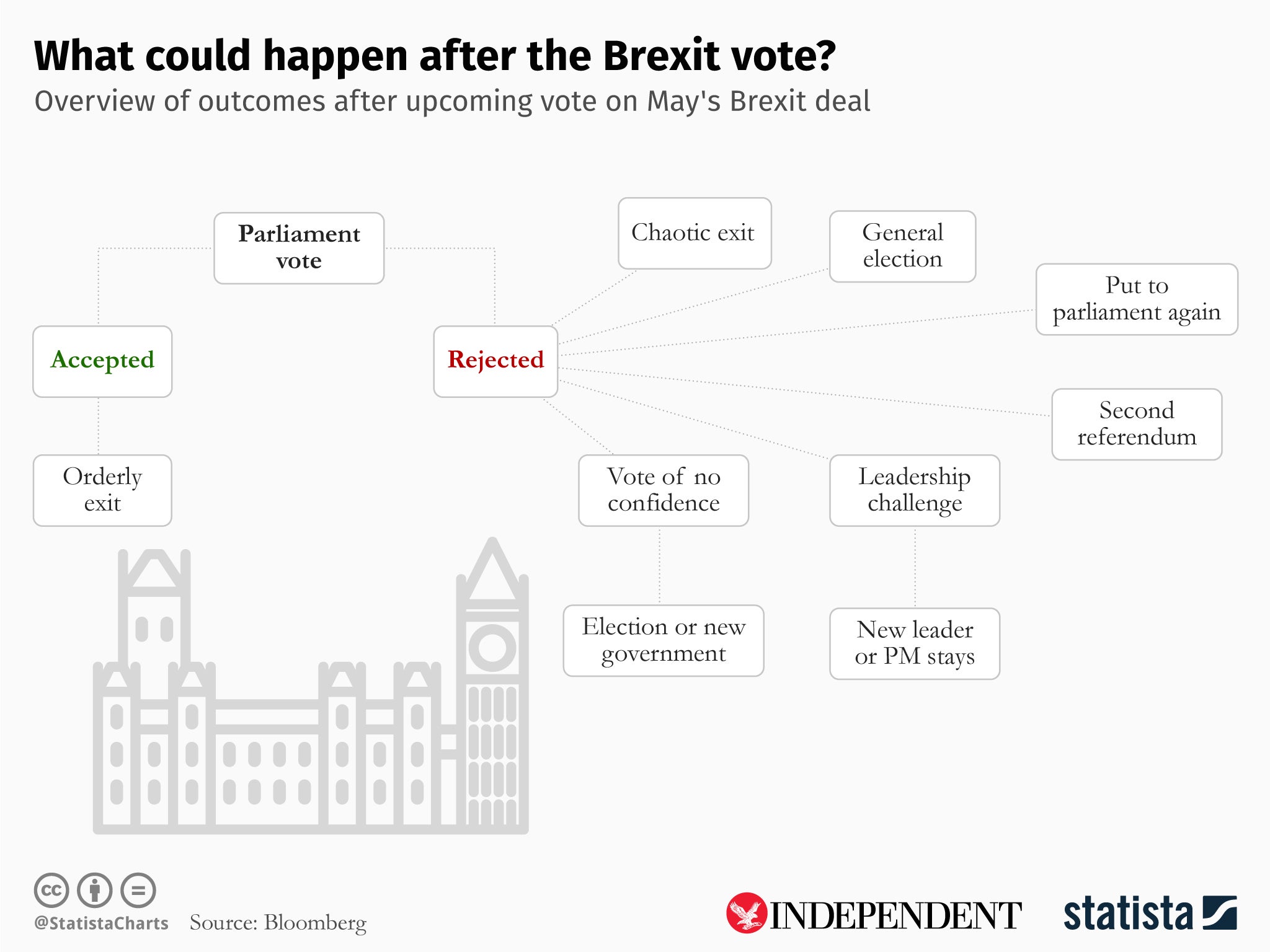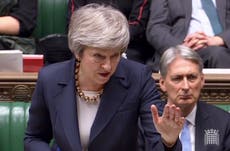What will happen if Theresa May’s Brexit deal is voted down? Here are all the potential scenarios
What we do know is that as a result of Tuesday’s amendment MPs will have the tools to force a Final Say

If MPs reject the government’s Brexit deal next Tuesday, there will be a whirlwind of political activity like nothing the UK has witnessed for generations. Although it is hard to predict exactly how things will unfold, a people’s vote will ultimately be the main game in town – not least because, by passing a momentous amendment on Tuesday, MPs took back control of Brexit from the prime minister.
But before then, there will be multiple twists and turns. Here’s a guide to the drama ahead, based on an analysis of what Labour, Theresa May and other players will do.
What will Labour do?
Keir Starmer told the shadow cabinet last week they should “move quickly through the gears” if the government’s deal was defeated. The first gear would be to launch a vote of no confidence in the prime minister.
It seems likely that this vote will fail, because hard Brexit Conservative MPs won’t want to bring down their own government however much they hate the deal. They must know that fighting a general election when they are split in so many ways on the most important issue facing the country is a recipe for losing.

There is, though, a small chance that Northern Ireland’s DUP will vote against the government, in which case it will almost certainly fall. But that doesn’t necessarily mean a general election. There will still be 14 days to see if anybody can secure a positive vote of confidence. Neither Theresa May nor Jeremy Corbyn would be able to. But it is just possible that a different Tory leader might or that a national unity government – a coalition of all parties – could be formed.
Most likely, there won’t be an election and Labour will then move to its second gear. It’s still unclear whether that will be to back a second referendum or to spend a bit of time looking at other alternatives. But it seems “inevitable” that the party will ultimately get there, as John McDonnell, the shadow chancellor, said last week.
Will the PM survive?
May could resign if she loses next week’s vote by a big margin. But she may hang on out of some sense of duty.
If she doesn’t resign, her own MPs may still try to kick her out. The hard Brexiters may well be able to rustle up the 48 MPs needed to trigger a contest that they failed to get last month. But she will still have a good chance of seeing off a coup, because there’s no obvious replacement.
If May is removed as leader or resigns, there will probably be an interim leader such as David Lidington, her de facto deputy, and then a bitter contest to find a permanent replacement – with everyone from Boris Johnson to Amber Rudd likely throwing their hat in the ring. Even a fast-track leadership contest would almost certainly take over a month.
Any interim prime minister will be a lame duck. It’s hard to see what Brexit policy he or she could pursue. On the other hand, under the legislation passed last summer, the government will still need to present a plan to parliament within 21 days – whatever happens with internal political ructions – in other words by New Years’ Day. MPs then need to vote on this within seven “sitting days” – in other words, days when they are actually at work. That deadline is 15 January.
If any of this happened, the public would be aghast at what a total mess Brexit was turning into. And precisely because the Tories won’t want that, May could well survive.
What will May do?
So assume the prime minister stays in post. What plan will she then present to parliament?
She doesn’t have to wait until 1 January. She could make her statement the very next day on 12 December. But she may need some time because she will first need to get cabinet to agree to what she is going to say – and that won’t be easy because ministers will be pulling in various directions.
Some will want “Norway-plus”, others “super-Canada”, a few will want to stick to the prime minister’s deal and see if it can be improved around the edges, and Andrea Leadsom reportedly thinks we should prepare to crash out with no deal. The problem is that all these ideas are hopeless – and, if May decides to go in any particular direction, she risks more resignations.
Norway Plus involves staying in the single market and customs union forever – with free movement, payments into the budget and rule-following. Quite apart from the fact that it is a terrible idea to turn us into political eunuchs, it has no chance of getting through parliament because Labour is opposed. What’s more, even trying to ram it through could split the Tory party.
Super Canada is a trade deal. The problem is the EU would only agree if we modified the so-called “backstop” so it applied only to Northern Ireland rather than the whole UK. There would then be customs controls between Northern Ireland and Great Britain. As May memorably said, no UK prime minister could agree that.
What about asking the EU for a better deal? She might be able to get a few minor tweaks. But it’s hard to see that moving the needle in parliament.
As for crashing out, that is an even more hopeless idea. Only a tiny number of MPs think it’s sensible – and, after Tuesday’s Commons amendment, the rest of them will be in a good place to stop it.
A bold move would be to back a Final Say and get ahead of where parliament is eventually likely to force her to go. But May is not known for her bold initiatives.
So she may revert to type, play for time and hope that MPs eventually back her deal. After all, the law doesn’t require her to produce a detailed plan merely to make a statement – and that could be extremely vague.
But, if she does this, MPs may fill the vacuum. And by the time Labour has gone through its gears, parliament is likely to join forces behind a people’s vote. Again, as a result of Tuesday’s amendment, they will have the tools to do the job.
Hugo Dixon is chair of InFacts and a founding member of the People’s Vote campaign






Join our commenting forum
Join thought-provoking conversations, follow other Independent readers and see their replies